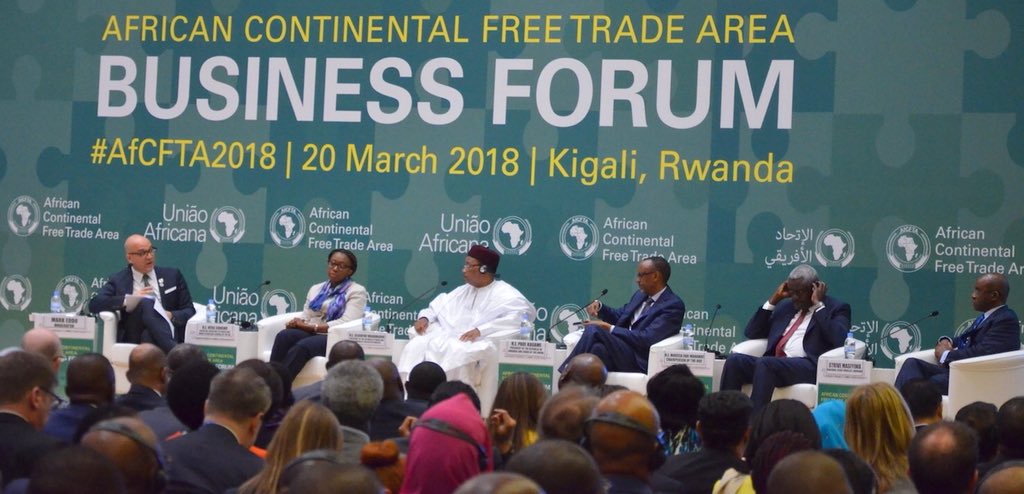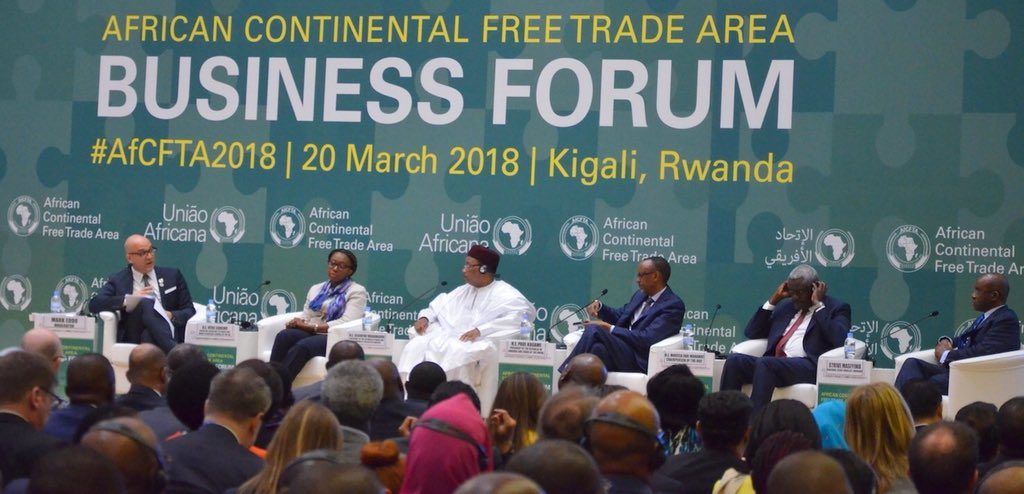African leaders launch world’s largest trade bloc


By Fauxile Kibet
African leaders are meeting today in Kigali Rwanda where they will launch what has been described as the world largest free trade area – in terms of countries involved.
The land mark pact brings dabbed Africa Continental Free Trade Area (AfCFTA) brings together 55 African Union members with a total GDP of $2.5 trillion and is one of the African Union’s flagship projects.
Speaking to journalists at the sideline of the summit, former Nigerian President Olesegun Obasanjo asked African leaders to embrace the AfCFTA deal saying that the pact will demonstrate Africa’s shift from aid to trade.
“That is where our salvation lies, trading amongst ourselves and consequently developing our economies. The agreement will inspire a change a perception of the continent by the rest of the world,” the former head of state said.
The deal aims to remove tariffs on 90 percent of goods, liberalize services and tackle “non-tariff barriers” which hamper trade between African countries, such as long delays at the border.
African Union chairperson Moussa Faki Mahamat rallied African leaders to support the process arguing that the Free Trade Area will result in the establishment of a market of over one billion two hundred million people, with a combined gross product of over three trillion dollars.
The host president Paul Kagame argued that African leaders have to be actively involved in ensuring that the pact get the necessary support from African governments so as to achieve its desired goals.
“The agreement needs to be ratified by Member States. Let’s do our part to communicate the rationale and the urgency of the Continental Free Trade Area to our parliamentarians, civil society organisations, and chambers of commerce, as well as to the media,” President Kagame argued.
However, Nigeria, Uganda and Tanzania have expressed reservations of the pact despite the appeals from African Union leadership for all states to support the pact.
Nigeria’s president Mohammoud Buhari cancelled his planned trip arguing that there was need for need for further domestic consultations about the deal. Tanzania has also reportedly said it would not sign the deal until its parliament has discussed it.
However, despite the challenges, heads of state from Kenya, Somalia, Djibouti, South Africa, DR Congo, Zimbabwe and Ghana are expected to sign the deal today.
Other expected leaders at the historic signing include Niger, Chad, Congo Brazzaville, Togo, Mauritania, Gabon, Guinea, Senegal, Mali, Madagascar, Guinea Bissau, Mozambique, Burkina Faso, Central African Republic, Libya, Comoros, Sahrawi, Lesotho, Gambia, and Angola.
ECONOMIC INTERGRATION
The African Union (AU) has over the years pursued an ambitious project for economic integration although its actions have appeared to prioritize polititical objectives.
The African union have shown interest of creating a common market and a monetary as well as an economic union.
However, in the post-colonial Africa, there have been failed attempts to industrialize efficiently using import-substitution, which gave rise to the notion of regional integration as a means to facilitate structural transformation in Africa.
African countries then embraced regional integration as a means to achieve their development goals with the aim of overcoming the challenges posed by small and fractioned economies working in isolation.
READ ALSO: AfCFTA: What you need to know
Several pan-African organizations have successively been working towards deepening economic, social and political cooperation and integration in Africa.
In 1991, African leaders signed the Treaty Establishing the African Economic Community (the Abuja Treaty), which provided the guiding principles and goals, and a region-wide framework to strengthen the integration agenda.
The vision of the leaders was to ultimately achieve an African Economic Community by first consolidating at the regional level, through creating and strengthening the regional economic communities, which would eventually merge into the African Economic Community.
The world will be looking at today’s pact to see if Africa can ultimately achieve its dream of forming a common market and a monetary as well as an economic union.